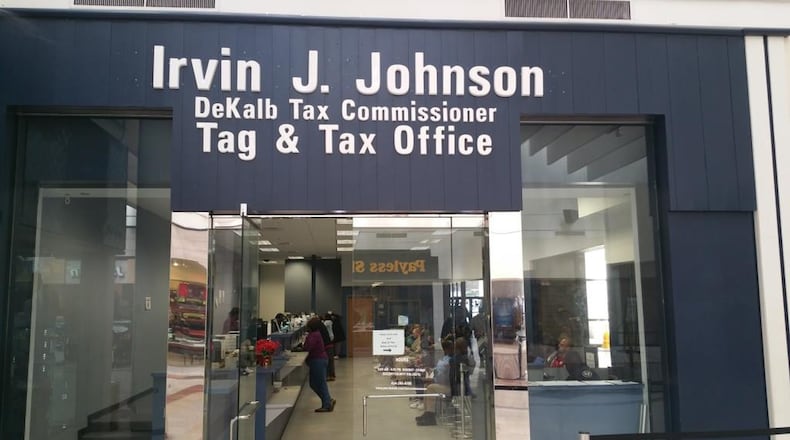When Irvin Johnson took over as tax collector in DeKalb County last year, he became Georgia’s second-highest-paid elected official.
His compensation of $285,781, inflated by fees charged to 10 cities for preparing their residents’ property tax bills, is more than that received by state Supreme Court justices ($171,404), Gov. Nathan Deal ($139,339) and Attorney General Chris Carr ($139,169).
Among the state's elected officials, Johnson's pay trails only Fulton County Tax Commissioner Arthur Ferdinand, who earned about $390,000 last year — in large part because of similar direct payments from the county's cities.
While the arrangement isn’t new, DeKalb commissioners say it’s unusual enough to warrant another look now that the county has a new tax commissioner.
"We should review the contracts," said Kathie Gannon, the DeKalb Board of Commissioners' presiding officer. "The cost of the service is what we need to charge. It's a new time and a new day."
When DeKalb Tax Commissioner Claudia Lawson took office 10 years ago, she negotiated her fees for generating tax bills for city residents. She retired Dec. 31, 2015.
Johnson has been receiving the same fees since he took office in January 2016, though Lawson's name is still on the contracts with the cities. Every city in DeKalb except Decatur, which has its own tax office, relies on the county for property tax administration.
Credit: Mark Niesse
Credit: Mark Niesse
On top of Johnson’s $173,000 base salary, he receives nearly $113,000 in payments from cities. That’s $2 per parcel except in the county’s three largest cities, which pay a $25,000 flat rate.
The contracts were negotiated between the cities and the county, and they automatically renew each year unless either party terminates the agreement.
Commissioner Greg Adams agreed that the board should revisit the issue.
“It’s something we would take a look into and see how it should be properly disbursed,” Adams said.
Johnson declined to comment. His staff members referred to his statements before last year's election, when Johnson won a four-year term.
“The pay tells you it’s a little more than an administrative job,” Johnson said in a May 2016 interview. “If we don’t follow the law in terms of collecting and distributing money, it’s a serious legal matter. Somebody could go to jail.”
While some other tax commissioners in Georgia collect fees from cities for handling their taxes, not all do. Tax commissioners in Gwinnett and Cobb counties don’t receive salary supplements from cities.
In Gwinnett, eight cities contracted with the county to pay $100,407 this year for tax and fee collections, but that money goes to the county — not the tax commissioner for the cost of printing bills, postage, accounting and customer service. In Cobb, cities send out their own tax bills, so no payments are made to the county.
Cities save money by working with county tax offices rather than setting up their own municipal tax departments, said Dan Ray, executive director for the Georgia Association of Tax Officials.
Tax commissioners deserve compensation for the job of handling so much of the public’s money — more than $2 billion a year in DeKalb and Fulton combined, Ray said.
"That's a boatload of money, and that's a responsibility and liability that somebody should be compensated for," Ray said. "I'm going to argue that they're worth it. They're taking on a huge responsibility."
Ray said a tax commissioner could face criminal charges if public money went missing from his office.
“It’s almost like a salary,” said Jackson County Tax Commissioner Candace Taylor, who receives $7,000 a year from four cities for their tax bills and then gives about $2,700 of that amount to her nine-person staff as a bonus. “Cities rely on our knowledge to prepare their tax bills. They have the option to do it themselves if they choose to.”
State legislators have tried to crack down on side payments to tax commissioners, with limited success.
The Georgia General Assembly passed a bill this year that eliminates a 50-cent fee that Ferdinand collected every time he sold a tax lien. That fee added up to between $22,000 to $31,000 extra per year to Ferdinand.
He still receives $1-per-parcel payments from the cities of Atlanta, Sandy Springs and Johns Creek to do their property tax bills, for a total of $210,281 last year. Atlanta paid him the largest amount: $152,865.
Ferdinand didn’t respond to emailed questions.
The city of Atlanta pays much more than other cities to both Fulton and DeKalb’s tax offices. The city pays DeKalb a total of $100,000, with $25,000 of that amount going to Johnson. That’s an expense to Atlanta taxpayers of $7 for each of the city’s 14,148 parcels in DeKalb. No other city in the county pays more than $2.43 per parcel.
Atlanta paid nearly $1.9 million to Ferdinand and Fulton’s tax office last fiscal year, according to a city spokeswoman. That comes to $12.40 per parcel.
Atlanta Councilwoman Felicia Moore said state action might be needed to rein in the city's spending on tax billing and collection.
“If there is an effort or will to change that, the state law really needs to be changed so tax commissioners can’t charge it,” Moore said. “As long as the law allows it to occur, I suspect it will.”
The payments to the tax commissioner are negotiated by Atlanta Mayor Kasim Reed’s office and approved by the City Council.
A spokeswoman for Reed declined to comment when asked whether Atlanta taxpayers are getting a good deal.
Susannah Scott, who ran against Johnson last year, said money paid by cities for tax preparation should pay the salaries of county employees, not the tax commissioner who's their boss. Besides the payments to Johnson, cities in DeKalb pay $78,700 to the county annually to process their taxes.
“They’re the ones doing the work,” said Scott, whose father Tom Scott was DeKalb’s tax commissioner before Lawson. “It’s them that are handling the mailing, the printing and the processing.”
Elected officials’ pay
Fulton Tax Commissioner Arthur Ferdinand: $390,170
DeKalb Tax Commissioner Irvin Johnson: $285,781
Georgia Supreme Court justices: $171,405
Georgia Court of Appeals judges: $170,343
DeKalb CEO Mike Thurmond: $153,498
Atlanta Mayor Kasim Reed: $147,500
Cobb Tax Commissioner Carla Jackson: $140,127
Gov. Nathan Deal: $139,339
Attorney General Chris Carr: $139,169
Secretary of State Brian Kemp: $130,691
Gwinnett Tax Commissioner Richard Steele: $122,732
Insurance Commissioner Ralph Hudgens: $120,394
Source: State, county and city pay records
MYAJC.COM: REAL JOURNALISM. REAL LOCAL IMPACT.
The AJC's Mark Niesse keeps you updated on the latest happenings in DeKalb County government and politics. You'll find more on myAJC.com, including these stories:
Never miss a minute of what's happening in DeKalb politics. Subscribe to myAJC.com.
In other DeKalb news:
About the Author
Keep Reading
The Latest
Featured





